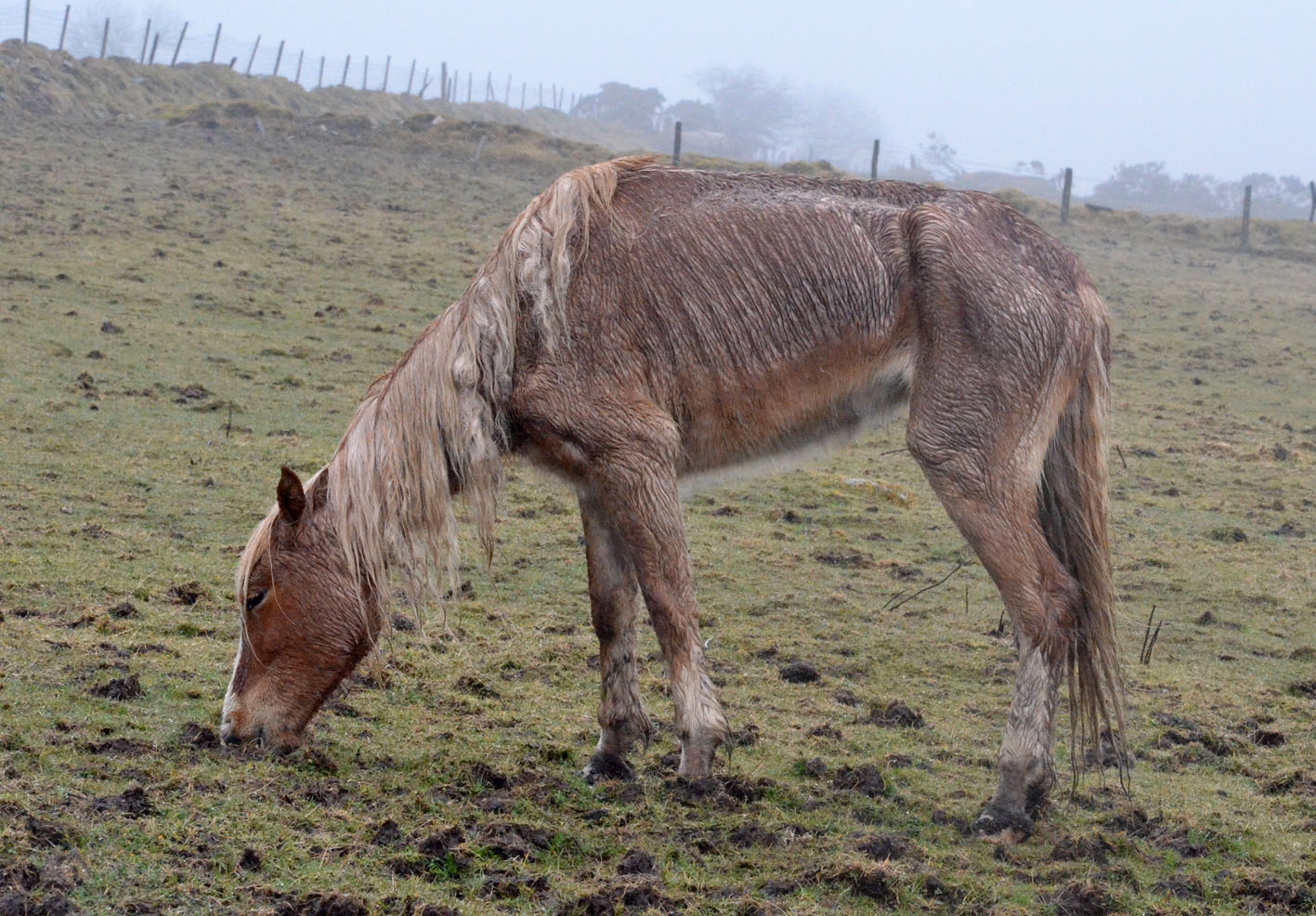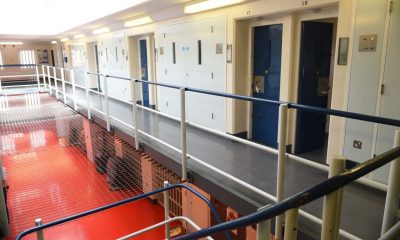News
Farmer’s suspended jail sentence for horse cruelty

 A PEMBROKESHIRE farmer has narrowly avoided a custodial sentence after admitting cruelty to animals.
A PEMBROKESHIRE farmer has narrowly avoided a custodial sentence after admitting cruelty to animals.
Gwilym Gilmour Thomas, 42, of Lodor Fach, Maenclochog, sat with his head bowed, as the three charges of causing unnecessary suffering under the Animal Welfare Act 2006 were read out.
Thomas pleaded guilty at the first opportunity to failing to adequately care for a Palomino Stallion, a Strawberry Roan mare and a Strawberry Roan horse.
There were emotional scenes in the court room as the defendant, from the dock, and his wife, from the public gallery, sobbed uncontrollably throughout the proceedings. His wife was comforted by a member of court staff.
Prosecutor Jon Tarrant told Haverfordwest Magistrates that this was the worst case of neglect of horses that the informing RSPCA officer, Mr. Abbott, had ever come across in all his years of experience.
Jon Tarrant told the court: “On April 11 the RSPCA visited a parcel of land in the vicinity of Rosebush, south of the Preseli’s. An officer photographed and videoed three horses, and a pony.”
“One animal had already died, while another was close to death, and the other two were severely malnourished; being 50-60% underweight” he added.
John Tarrant continued: “The first field the officer entered was extremely bare, and there appeared to be an area where a bail of hay had been put out previously. In that field the officer saw one horse which was struggling to lift its head and looking disorientated”
“He also found an empty bath tub which had barbed wire in the bottom of it, which had previously been used for water for the animals” he said.
John Tarrant continued: “On attempts to recover the surviving animals, one of those horses tried to evade capture – but it had to stop every so often as a result of its poor condition.”
“The fourth horse, found in another field, was estimated to have died 24 to 48 hours previously.
In a recorded interview with RSPCA officers, Thomas simply said: “I’ve failed them, I can’t forgive myself – I never realised they were struggling, I failed them.”
Defence solicitor Richard Griffiths asked “whose responsibility is it in the main to look after the horses?”
Mr Thomas’ father owns the field and the horses but generally asks his son to feed the animals.
In interview, Thomas senior said: “If I had any idea they were going down, I would have done something”.
Defending, Richard Griffiths, told the court: “My client has admitted his guilt. In interviews he was extremely sorry for what had happened to the horses.
“However, whilst admitting responsibility, you will notice from the bundle that there were two people interviewed under caution,” he said.
Mr Griffiths continued: “The defendant’s father also admitted he was at fault, but because of his age and ill health, it was decided not to be in the public interest to prosecute him.”
Mr Griffiths read out extracts of the interview between the RSPCA and the defendant’s father, Thomas senior. Mr Griffiths told the court: “It seems that the defendant’s duty was to bring food to the horses on an ‘as and when’ basis, on the instructions of his father.”
“His father suffered from chest pains and was unable to walk the length of the paddocks,” he added.
“A lady, who also had horses in the paddock, had been helping as well with the care of the animals,” he said.
“Once the lady had taken her horses away Thomas senior had forgotten to inform anyone including the defendant. This is the reason why the animals became malnourished,” Mr Griffiths explained.
“Despite viewing the animals daily, Thomas senior could only do so from a distance because he was unable to walk far. It seems that the majority of the responsibility rests with someone who is not before the court, and the defendant only played a minor role,” he said.
Mr Griffiths went on to say: “In fact, the defendant is in charge of a thousand livestock and has an excellent record.
“Last winter, one of the worst on record, he did not lose a single animal. This is testament to his attention and care of the animals he is fully responsible for.
‘’My client lives in a static caravan with his wife on the farm,” he said.
“He shares the facilities of the main house, but only receives £25 per week allowance from the business, despite working up to 17-hour days,” he told the court.
The clerk of the court told the magistrates: “This is an offence where you have to impose a custodial sentence. You have to follow your guidelines, you have no option
“However, it is within your powers to suspend the sentence,” he added.
Thomas was given a one year suspended jail sentence, ordered to undertake 300 hours of unpaid work and was disqualified from keeping horses for five years. He was ordered to pay prosecution costs of £1102.60.
Speaking after the hearing Richard Abbot said “The decision to prosecute Gwilym Thomas was one which was made by a case management officer at RSPCA headquarters.”
“It is my view that he should not have been prosecuted without his father being before the court as well.”
“Animals have suffered over a long period of time. Usually in cases like this people deserve to go to prison.
I was however, worried in court that William Thomas would get a prison sentence as this is not what he deserves.”
Speaking to The Herald, John Tarrant said: “The RSPCA is stuck between a rock and a hard place. They would be criticised for prosecuting and they would have been criticised for not prosecuting this case.”
CAPTION: One of the surviving horses, two died. Some of the photos are too shocking to publish.
News
Welsh pensioners to receive state pension increase amidst mixed reactions

STARTING this month, over 600,000 pensioners across Wales will see their State Pensions rise by up to £470 annually, following the UK Government’s adherence to the ‘triple lock’ policy. This policy ensures that pensions increase each year by the highest of average earnings growth, inflation, or a minimum of 2.5%.
Government’s Position
The UK Government has emphasized its commitment to supporting pensioners through the triple lock. In a recent statement, it was noted that this commitment would result in the State Pension increasing by up to £1,900 over the course of the current Parliament.
Opposition and Think Tank Critiques
However, the policy has faced criticism from various quarters. The Liberal Democrats have raised concerns about the real impact of the pension increase, pointing out that due to the freezing of income tax thresholds, a significant portion of the pension rise could be offset by increased tax liabilities. They estimate that a typical basic rate tax-paying pensioner might see 77% of the pension increase negated by these tax measures.
Additionally, the Institute for Fiscal Studies (IFS) has questioned the sustainability of the triple lock mechanism. They argue that while the policy aims to protect pensioners’ incomes, it may not be the most efficient approach and could lead to unpredictable fiscal burdens.
Pensions Minister’s Stance
Torsten Bell, the newly appointed Pensions Minister, has previously described the triple lock as “rubbish” and advocated for its replacement with a system that aligns state pension increases with benefits for jobseekers and the long-term sick. Despite his past remarks, recent reports indicate that he is now “fully committed” to maintaining the triple lock.
Economic Implications
Financial experts have also highlighted potential unintended consequences of the pension increase. The freezing of personal tax allowances means that some pensioners may find themselves pushed into higher tax brackets, thereby reducing the net benefit of the pension rise. This situation underscores the complex interplay between pension policies and tax regulations.
In summary, while the increase in State Pensions is a welcome development for many Welsh pensioners, it has sparked a broader debate about the effectiveness and sustainability of the triple lock policy, as well as its interaction with the broader tax system.
Crime
Over 120 Carmarthenshire people identified as ‘money mules’ in fraud probe

More than 120 people in Carmarthenshire, mostly living in the Llanelli area have handed over their personal bank details to criminals involved in money laundering in exchange for financial gifts.
Economic Crime Team officers from Dyfed-Powys Police identified the individuals as part of an ongoing criminal investigation and issued notices advising them to stop the activity immediately or face prosecution.
Throughout February, the team visited people who had been linked with a suspected fraudster, as part of Operation Henhouse – a month-long nationwide clampdown on fraud offences.
On speaking to those involved, officers learned how the individuals opened online bank accounts using their personal information and identification and gave their account login details to criminals in return for cash, who then used their bank accounts to launder money obtained through crime.
The team offered safeguarding advice and warned them about the dangers of opening bank accounts to be used by someone else for criminal activity.
Many were unaware of the implications of what they had done and thought it was an easy way to make some money. Some were given financial gifts ranging from £50 to £200, while others were promised money but did not receive it.
Dyfed-Powys Police Fraud Investigator Sian Stevens said: “Through intelligence, we were made aware of a fraudster who recruited a number of people in the Llanelli area to open bank accounts, which were then subsequently used for money laundering purposes.
“The Economic Crime Team visited over 120 individuals in February to explain that they had been used as a money mule – this is someone, who has allowed their bank account to be used to send criminal money. We issued them with cease and desist notice to interrupt any further fraud by making sure they were aware what they were doing was a criminal activity.
“Many of the people were linked to each other. Some were family members or in the same friendship groups, ranging from young adults to pensioners. The accounts had been opened as a direct or indirect interaction with the fraudster.
“For example, there were some instances where an individual opened a bank account after contact with the fraudster and then went on to tell their friends, ‘you can earn £50 if you open up a bank account and give the details to this person’ and so on. That was just one of many examples how the fraudster managed to obtain personal bank details.”
Dyfed-Powys Police Economic Crime Team Manager Paul Callard said: “People fall victim to fraud every day and the impact on victims can be devastating, both financially and emotionally.
“They can be taken advantage of by criminals and encouraged to allow their accounts to be used. People should be very careful about who they provide their personal information to.
“We will not tolerate fraudulent activity and will look to tackle criminals at every opportunity.”
How to avoid becoming a victim of fraud
- Always use the ABC of scam awareness. Never Assume or Believe a caller, email or text is genuine. Always Confirm by contacting a trusted relative, friend, your bank’s fraud department or the police to check it is genuine.
- Remember the police will never call you asking you to assist with an investigation by withdrawing cash for them to collect, or requesting to collect your bank card. If you receive a call purporting to be from the police and are unsure it is genuine, ring them back via 101 using a different telephone.
- Avoid clicking on links in emails and text messages from unknown sources, as they are liable to be a scam.
- Always use a strong and separate password for your email address by using three random words.
Do you know what will happen if you are caught allowing criminals to use your bank accounts to money launder?




Community
Pembrokeshire projects are building success

PEMBROKESHIRE County Council’s Building Control Team is congratulating local building and design projects for success in the LABC Building Excellence Awards 2024.
The LABC Building Excellence Awards are the largest business to business awards in the building control sector.
They celebrate buildings and design teams that have overcome the challenges of complex technical and construction issues and put the spotlight on innovative and creative building work.

In Pembrokeshire, D & O Construction Ltd, Julian Bishop Architect, Redstone Architecture and AB Rogers & Son Ltd, Hayston Development & Planning Ltd all achieved success on some high profile local projects.
In the Regional LABC Building Excellence Awards 2024, Berry Lodge, Newport won the Best Residential Extension in Wales prize with work carried out by D & O Construction Ltd and with agents Julian Bishop Architect and Redstone Architecture.
Highly Commended was the development at Plas Y Castell, Llawhaden, carried out by AB Rogers & Son Ltd and Hayston Development & Planning Ltd.
The Berry Lodge development then went forward to the Grand Finals at Grovesnor House in London where the top projects across the UK were celebrated.

Council Building Control Manager Sam Goodwin said: “Building Control is delighted to work on these projects which highlight the skill and innovation of developers locally.
“Pembrokeshire County Council Building Control is proud to be part of LABC Awards. The Local Authority Building Control (LABC) awards were set up to celebrate excellence achieved through high building standards, technical innovation and sustainable designs.
“The Awards are an opportunity for the industry to celebrate good building practice and winners demonstrate how positive working relationships with local Council building control teams achieve high quality, sustainable buildings.
“The awards are unique because they recognise how this cooperation improves building standards and professionalism across the industry and it is great to see local contractors, agents and designers within Pembrokeshire receive recognition in achieving these standards.”
If you would like to contact Building Control at Pembrokeshire County Council, please contact Building Control via the website www.pembrokeshire.gov.uk/building-control or alternatively contact 01437 764551
-

 Business5 days ago
Business5 days agoSpaceX eyes Milford Haven for new UK facility
-

 Crime6 days ago
Crime6 days agoPembrokeshire farm worker accused of threatening to burn employer’s farm
-

 Crime6 days ago
Crime6 days ago‘Yeah but no but’ insult to female officer lands Monkton man with court fine
-

 Features6 days ago
Features6 days ago‘We weren’t wild. We were unprotected’: A generation groomed and forgotten
-

 Community7 days ago
Community7 days agoSpectacular evening of music at Ysgol Greenhill
-

 Crime5 days ago
Crime5 days agoLeaked messages reveal shocking culture at HMP Parc amid misconduct probe
-

 Politics6 days ago
Politics6 days agoProbe into ‘escalating’ horse fly-grazing in Pembrokeshire
-

 Crime6 days ago
Crime6 days agoInquest reveals tragic consequences of inadequate medication in prison































